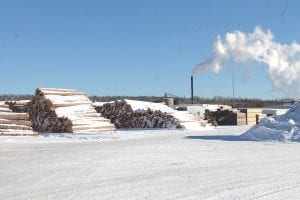With no adverse effects or incidents recorded last year, on March 8 Minnesota Senator Tom Bakk reintroduced a bill to allow Hedstom Lumber Company to continue operating its boiler at night without a licensed boiler operator onsite to manually inspect it.
Last year, despite criticism from some of the state’s boiler operators, both Bakk and the late Minnesota House Representative David Dill (DFL) introduced legislation written specifically for Hedstrom Lumber Company to run its high-pressure boiler at night from a remote location.
The goal was to operate the sawmill’s dry kiln when none of the mill’s six licensed boiler operators were working.
While the special legislation passed easily, it had a sunset clause of January 1, 2016, at which time it was to be reviewed by a working committee of legislators and department of labor and industry members.
One of the bill’s biggest opponents was Reed Sprung, president and CEO of Sprung Services, Inc. out of New Brighton, Minnesota, who said he was strongly against the language in the amendment. He and his wife sent out thousands of e-mails to some of the 31,000 licensed high and low pressure boiler operators in the state. The Sprung’s company provides businesses with low and high-pressure boiler operators and offers a wide array of services that include maintenance, repairs, and training for people to obtain their boiler licenses.
At the time Sprung said, “There were no experts suggesting the proposed new law would be safe. It would be difficult to find such a person. The only people speaking in favor of the law were the person who would benefit from it financially and the politicians (with no boiler experience or training) who support him.”
However, Sprung was one of the people asked to serve on the committee to review the legislation, and what came from that seems to be a working compromise.
Sprung said, “The workgroup outlined much better language than is shown at the end of this [new] amendment. Howard and I [and many others] both agreed to the outline for creating new language, however, it must go through the rule making process which may take longer than it will for the original sunset on the initial language to expire. For this reason, Senator Bakk has offered an amendment that eliminates the sunset so Hedstrom Lumber would be able to continue to operate as before.
“It is my hope that Senator Bakk’s amendment can be changed to extend the sunset by one year rather than eliminating the sunset altogether. This will give the Department of Labor and Industry time to finish its work. I believe the department will offer an amendment that is much better for public safety and the state’s thousands of boiler operators than continuing with the current language.”
Howard Hedstrom, president of Hedstrom Lumber Company said, “There is some rule making going forward. I’m fine with that and that can be added later, but for now I asked Senator Bakk to take the sunset clause off.
“We have been operating safely with no incidents and have invested in the latest technology with the most advanced controls. We also invested in training our operators who keep close attention to the boiler and keep it well maintained. When we get checked we always get complimented on how well our facilities are kept up. It wouldn’t make a lot of sense for us to invest in upgraded steam traps and other equipment if the sunset clause remained in place. If the legislature decided to end it, we would be stuck with a lot of wasted investment.”
Hedstrom’s Lumber Company, a family owned business, celebrated its 100th year of continuous operation last summer. Howard Hedstrom said the company has an obligation to its employees to properly maintain the boiler in a secure and efficient manner. He added the newer technology allowed the company to “drive toward operating at a lower cost and operating more efficiently while maintaining safety.”
Senator Bakk’s bill and a companion bill (which was amended to include the new language) in the House of Representatives authored by the late David Dill was referred to Jobs, Agriculture, and Rural Development Committee for discussion and recommendation before a vote is taken.



Loading Comments